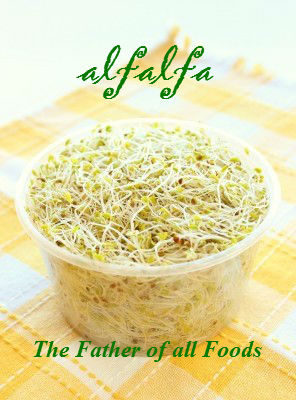Latin name: Medicago Sativa
Common names: Lucerne
Description: A medicinal herb that takes shape of a clover with small clusters of purple flowers followed by fruits that spiral out that contain 10 to 20 seeds
Alfalfa, as the Arabs called it is “the father of all foods” because of the dietary and medicinal uses of this amazing herb. This herb has been used ever since the sixth century by the Chinese who found many advantages in using it.
The leaves of this plant are very rich in nutrients and minerals such as calcium, carotene, magnesium and potassium. Nutritionally, it is said to be high in fiber, vitamins (B group of vitamins, vitamin C, vitamin D, vitamin E, vitamin K) and minerals and contains all required digestive enzymes. Vitamin D has been found in the sun dried hay of this herb.
The taste of this herb could be described as a burning sensation at the tip of the tongue, but once eaten frequently, the taste will start to taste much better.

What it is used for:
- Lower blood sugar levels
- Lower cholesterol levels
- Promotes blood clotting (contains Vitamin K)
- Helps in preventing bone loss (due to estrogen deficiency) and helps in formation of new bones
- Effective diuretic (increases urine flow) – reduces water retention and swelling
- Good laxative (stimulates bowel movement)
- Atherosclerosis and heart diseases
- Urinary tract infections
- Kidney, bladder and prostate disorders
- Helpful in lowering fever
- Prevent tooth decay (contains fluoride)
- Could suppress appetite for heavier food
- Helps with detoxification (for drug and alcohol dependency)
- Effective in treating bad breath (contains chlorophyll)
- First line of defense for infection (increased production of white blood cells)
- Treatment for anemia
- Treatment for hormonal imbalances and menopausal problems
How it is used:
The parts used in the alfalfa plant are the stems, leaves and sprouts that come from the seeds. This medicinal herb can come in forms of a supplement, liquid, teas and could be mixed in to become a cream or for hair treaments. The most effective way to consume alfalfa is through a juice.
Side effects and caution:
- It is always best to consult your healthcare professional before consuming this herb
- Proven safe for a majority of people but a small percentage with lupus-like symptoms
- Do not take during pregnancy
- Contraindicated in autoimmune disorders
- Do not take if with systemic lupus erythematosus (SLE)
- Contraindicated with people taking blood thinning medications (Warfarin or Coumadin)
- Contraindicated with medications that lower the immune system (Immunosuppressants)
- Do not take if taking contraceptive drugs
- Excessive intake of this herb could cause photosensitivity and breakdown of red blood cells
- Long term use might not be safe
Alfalfa contains natural components that could have many positive effects to out bodies. Besides being planted in gardens at our very own home, supplements may also be found in herbal stores and other health shops. You may wish to consider using this herb as treatment for the mentioned ailments above because it is thought to have properties to help out and improve a number of medical conditions.
